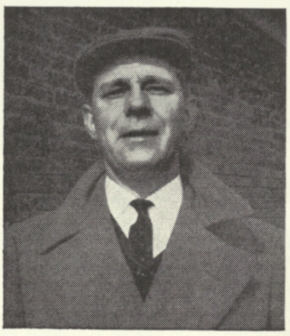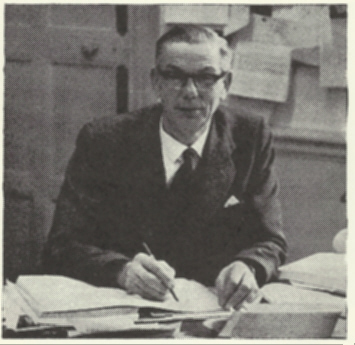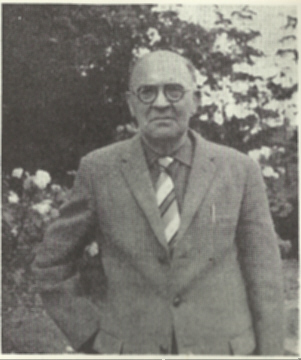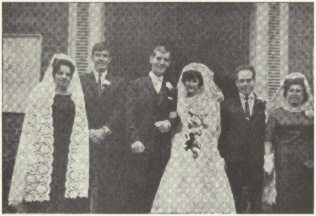|
'PUBLICITY', 'Public Relations Officer, these are words one has learned to accept and understand in today's high-speed sales community, and
within our own organization our Public Relations Officer holds perhaps one of the most responsible positions. Let us have no doubt about our
situation, either we are able to 'sell' to the general public the necessity for them to subscribe to our organization, by proving to them the greatest
importance of our work, or we fail to function. The all-important question is, of course, what is the image our P.R.O. should use as his 'selling'
point, so that people do not feel that they are supporting an organization whose 'window display’ is somewhat different to what is in the shop?
When dealing with normal merchandise there is no problem; the article is either up to the advertised standard and we are satisfied, or it isn't and
we are not! Our P.R.O. is responsible for advertising our cause through every channel available, and the image he presents must not be a false one,
otherwise the confidence of the public would be lost. I think it can be said without fear of contradiction that our 'sales literature' bears the hall mark
of young children, which is fair enough. I have no figures at my disposal, but I would imagine that 75 per cent, of our children are under the age of
12 years.
But what of the other 25 per cent.? We here at Goldings are acutely aware of the latter age group, of which in fact 75 per cent. are between the ages
of 13 years and 16| years, and the other 25 per cent, are between 16 years and 21 years. The question is, do these age groups (and in particular the
latter) get enough of the right kind of publicity? I must confess that I often feel they do not, at least nationally, at the same time I wonder whether
the general public would be as generous or more generous if they were aware of the problems encountered with the training of the higher age groups?
I am sure it is not generally realized how great a contribution the staff in a Home such as ours makes to the lives of the adolescents, whether they
be learners, pre-apprentices, or apprentices, and
[Continued at the end of the book
'NEW LAMPS FOR OLD'
IN THE fairy tale land of Aladdin, the wicked uncle offered new lamps for old. The new ones gave a good light, but it was the old one which
supplied the magic, that produced the Genie, who without sweat and toil could perform wonders and provide untold riches. No wonder we get a
sentimental attachment to the ancient lights. In school we must be prepared to discard comfortable, old and cherished notions of methods and
routine. Our recent acquisition of modern, high-class schoolrooms, to match the excellent workshop facilities, will not automatically make our
work more effective, but it has at least freed us from the shackles imposed upon us by the old. A readiness to accept new ideas is equally incumbent
on boys and staff.
Far too many boys have been conditioned to sitting in rows in classrooms, waiting for a teacher to tell them what to do. Some still think of school
as a place one must attend, where people who are paid to do the job must wage perpetual war on the ignorance of youth. Some are passive resistors,
expecting to be educated by the efforts of their teachers, with little help from themselves. A very small, but ultra-stupid, faction even seem to go
out of their way to increase the strain of an already difficult job. This attitude is both self-destructive and totally out of date. The intelligent 'with-it'
boy of modern society, whether his hair is long or short, regards school as a place of opportunity, where he may develop his gifts and learn to
express himself by creative work, both with material objects and in the world of ideas, through the mastery of the spoken and the written word.
he School provides the space, the materials, tools and equipment, text books and library for general information and the enjoyment of reading. It
also has a staff, whose job it is to assist boys in their self-imposed task of learning. They have special knowledge and skills, which they are anxious
to put at the disposal of the students. If you are one of these, you should follow your own course of study, turning to the teachers whenever you need
help. So here is a challenge to the boys. Take those blinkers off. Don't keep going round the same old track: look around, decide where you want to
get to and set your course towards this goal.
To all members of staff, too, comes the challenge of new ideas, We also are accustomed to teaching classes. How many boys am sitting and
vegetating in them? There can be few schools which better designed or staffed than ours for the individual approach To work such a system
requires much thought and advance planning and some boldness of attack. Such a plan of individual group projects assumes that boys really want
to learn, which majority is true. It is difficult to prevent a fool from own time, but there is no need to let him waste the time are now able to think
in terms of the total facilities of the establishment, in which home staff, general and specialist create a real working partnership, and boys can be
encouraged to play a part in planning and working through their study and training. There is every prospect that important and exciting year for us.
R. F. W.
WHEN MR. GREENHILL first joined Goldings in May 1953, he was responsible for the maintenance of all
sports areas together with care and issuing of sports equipment. In those days with over two hundred boys
thirsting for active sport—no distracting TV addicts in that era—six football pitches and two regular Staff
and Boys cricket elevens, life could be hectic to say the least. Everyone associated with sport between 1953
and 1959 felt a sense of admiration and gratitude to Mr. Greenhill for the high standard of playing surfaces
prepared by him with skill and experience.
In 1959 a vacancy occurred in the kitchen gardens and a transfer was arranged. This new life was nothing
unusual to Mr. Greenhill whose earlier experience had covered both private and public parks service.
Gardening had been his life-long interest, commencing as a garden boy at Amwellbury House, followed by
a period at Poles Farm, Ware. From 1942 until 1946 he was on active service in the Mechanical Equipment
Company of the Royal Engineers, moving through France, Germany, and the Netherlands.
Returning to civvy-street an interesting spell was spent at Roch-fords', still famous for their pot-plants, before
moving to parks gardening for the Hornsey Borough Council as a propagator. Just prior to coming to Goldings,
further distinct experience was gained at landscape work.
Mr. Greenhill's main interests, apart from gardening, are music, wood-carving, and art. Older members of staff
will remember their appreciative surprise at a Staff and Boys exhibition a few years ago where they had the
opportunity of seeing some of his excellent carved models.
L. E.
OBITUARY
MR. J. MASLIN
Some Appreciations
IT WAS with sadness that we heard of the sudden death of Mr. Maslin. He came to Goldings in 1922
with the first Barnardo contingent from Stepney.
In his position of School Secretary to the then Governors, and later to the Headmaster, he gave unstinted
service to Barnardo's. Out of 'working hours' he devoted much time and energy as secretary and treasurer
to the cricket, football, billiards, and social clubs, of which he was also a very active playing member.
Before his cremation at Enfield a service was held in the School Chapel, attended by Mrs. Maslin and
the family, and the staff and boys.
Having known Jim for 35 years I shall always remember his exceptional devotion to duty: and miss
very much his 'perky' cheerfulness.
To Mrs. Maslin and the family we extend our deepest sympathy.
H. T.
For many years Mr. and Mrs. Maslin were our next door neighbours. Good neighbours are common at Goldings and Jim and Doris were no
exceptions. Always ready with a cheerful greeting and many were the over-the-fence chats during the summer months. Jim loved his garden and it
was amazing how he coped with his huge plot although latterly never enjoying the robust health necessary to cope with this pursuit. Meticulously
he trimmed the edges of grass paths and borders after every mowing, philosophically, on hands and knees progressing around some hundreds of
yards, clipping away with his hand shears.
As Tottenham Hotspur fans we had our moments of elation and despair and then those two glorious seasons of Tottenham glory when being
supporters was really worthwhile.
When Mr. Maslin retired the change seem to revitalize him, and gradually, with the. help of Mrs. Maslin, a fresh garden surrounding their new
bungalow took shape. A sheer bank of gravel was cut into and little steps appeared, a trim lawn was formed half-way up the bank, providing a
restful plateau, and in no time at all the typical Maslin technique (neat orderliness from complete chaos) was stamped everywhere.
It was, and still is, difficult to realize that Goldings has no Mr. Maslin. Whilst his colleagues walk the grounds so will Jim. He gave to life far more
than he ever expected of it, an inspiration to all who would seek guidance upon how to live.
R. S.
N.B.—If any reader would like a half-plate photograph of Mr. Maslin, the Editor has a limited supply at 7d. each.
ED.
THE RETIREMENT OF MR. H. DE' BOECK
ON THURSDAY, 8th July, 1965, after forty-four years' devoted service, Mr. Harold de' Boeck finally laid down
his dividers and mallet and joined the honourable ranks of the retired.
Knowing Mr. de' Boeck's zest for action, we are quite certain that retirement will not mean sitting around, and
who knows the principality of Hertford Heath could easily be jolted into greater activities now that one of their
leading citizens is with them full time.
During the forty-four years which Mr. de' Boeck spent as a teacher of sheet metal work, there are many like
myself who appreciate the good training we received. He not only taught boys to be good craftsmen, but
encouraged them to be ambitious and to look at life in a better way. Throughout his service he worked
conscientiously with the welfare of the boys his first concern.
There was a very pleasant surprise for Mr. do' Boeck before our Headmaster presented a plaque and a cheque
on behalf of the staff, when the boys of the Sheet Metal Work Department presented him with a Parker pen
and pencil set. This unexpected event really set Mr. de' Boeck back on his heels.
On behalf of all the staff and boys I would like to wish Mr. and Mrs. de' Boeck a long and happy retirement.
One further point of interest, is the fact that Mr. de' Boeck was the only remaining member of staff who came
to Goldings when the School moved from Stepney. So ends yet another chapter!
J. M. B.
|






